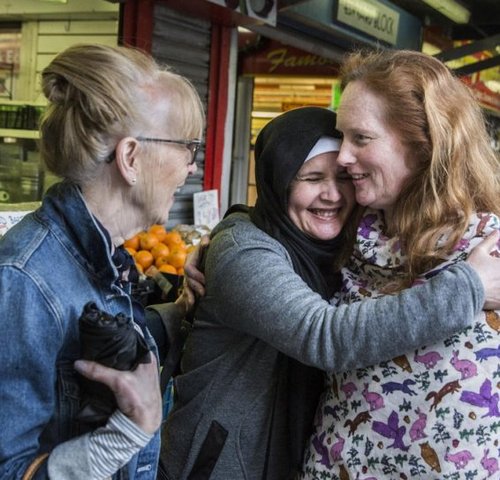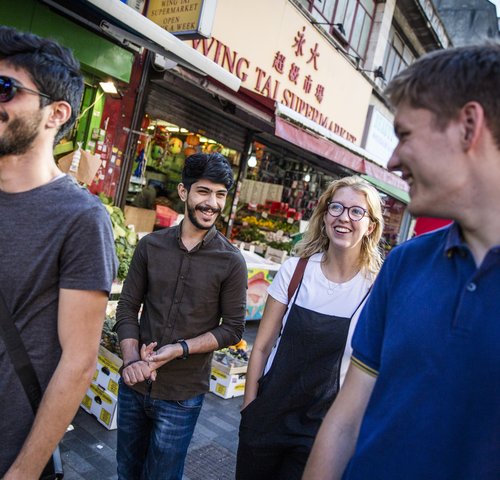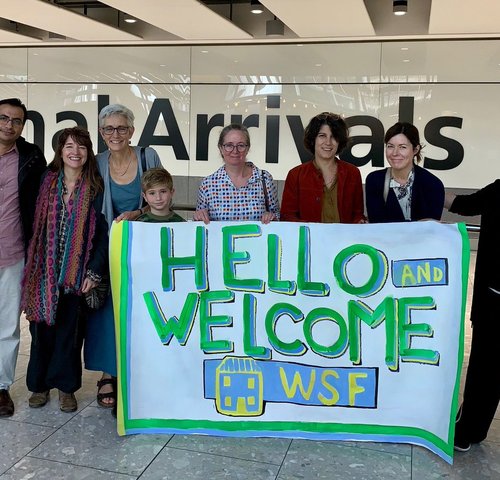Education in Resettlement: A Case Study From Cornwall
Education in Resettlement: A Case Study From Cornwall
In the resettlement of a refugee family, education plays a key role in the children's integration process. For most, school is where we develop our deepest bonds and nurture our most precious friendships. Often, it’s where we come to understand who we are.
In more technical terms, we perfect the conjugations of this foreign language, explore culture through daily interactions and observations and absorb the curriculum that secures a prosperous future.
Below, Ellie Stacey shares her experience with education in resettling two refugee families in Cornwall.
Case Study
I have had experience of liaising with schools in preparation for community sponsorship in two areas of Cornwall as part of Bude Refugee Support Group, (BRSG) in 2017, and more recently in Falmouth, as part of ‘Falmouth and Penryn Welcome Refugee Families’ (Welcome). My background is in education. I have been headteacher of two primary schools, one in rural Oxfordshire and the other in Oxford City, so I am familiar with both multicultural schools and rural schools. The school where the children attend is an important hub of a community sponsorship, so the group’s relationship with the school is crucial. Schools are places of welcome, orientation and sanctuary for many families. My first advice would be that is there is a choice of schools, take time with the choice and check out the school’s attitude to welcoming a refugee family. I know that most teachers will do their absolute best for their students, but Cornwall, like many rural areas, is monocultural and is inexperienced in teaching children who do not speak English. Is the school receptive to finding resources for the children, how will they approach this? Both in Bude and in Falmouth, there was a warmth and a willingness to welcome the children. Once the choice had been made, both schools provided uniforms, bookbags, etc, and, more importantly have been open minded and open hearted in the relationship going forward.
In some of the areas of the south west where community sponsorship is happening, there is only one village school so the relationship may need work. But a community sponsorship group has a lot to offer to a school. There may already be a relationship as members of the group, or their children or grandchildren, have attended the school. Even better if their children are still attending. There is funding attached to the community sponsorship. In Falmouth, we arranged a group of volunteers to be in school with the children for the early days. To comply with safeguarding requirements, we gave a letter of assurance with details of the safeguarding checks and training that volunteers had undergone.
When I first started teaching (in the 1990s) children that didn’t speak English were assumed to have learning difficulties so sometimes ended up unchallenged. In one school that I arrived in; I was shocked to see that two Japanese children that attended were routinely carried around the playground by the other children like dolls. On discussing this with the children, they decided that it was not right to distinguish the children like this and stopped. My main objective with the schools is to make sure that they are seeing the children as unique and planning accordingly, not thinking ’refugee child’ or ‘EAL child’ but a special child, like all the others, whose learning is individual. Nursery or primary age children will learn English very quickly. In this spirit I would urge groups to think about whether it is appropriate for the school to hold an ’assembly about refugees’ as they arrive, and to consider carefully whether what might be intended as welcoming might set the children apart from others. Schools should have a plan about how they teach their children about refugees and others in the world which stands outside marking a new arrival.
Having said that though, it is important that key staff know the family’s back story so that they can plan and look out for signs of trauma. The children need to make their own way in school just as a child who arrives in school from another part of the UK, for instance.
The family in Falmouth arrived in early December, and we all agreed that they should start school in January and miss out on the school Christmas craziness. A pre-visit with the family was essential, to familiarise everyone with school routines, where to drop off and pick up, and to complete all the paperwork. An interpreter is a must and the school should arrange this. I went on a tour of the school with the year 2 girl in the family, led by the class ‘star’ who was our guide. She encouraged her new friend to sit in the cosy spaces and try the books out in the library, which brought about lots of smiles. As we passed by a display of French words, the year 2 girl animatedly joined in, as she had been to a French speaking nursery in the Lebanon.
In Bude, the second family had three very young boys who were close in age, and it worked well for all three to attend the local prep school for a year. The school was able to access nursery funding, and offer reduced fees, which another local charitable Trust covered. But it was so good for that family to start their UK education in one setting, in small groups, close to their home. Community sponsors are normally a pretty resourceful bunch, when it comes to understanding local connections, I find. The first family have been in school for 3 years now, with the older child successfully transferring to secondary school in the last few months.
The Falmouth family have done one term in school, prior to the lockdown as I write, and are doing well. We have a close working relationship with the school and meet the teachers regularly. Just now we are undertaking lessons in lockdown on Zoom twice a week, planned from the school and other resources.
In both sponsorships the role of the group in helping learning is important. In Bude, volunteers have been involved in after-school and in-school support for the children which has helped them to make progress.
There are some great resources to draw on. I especially like this article from Headteachers’ update, which summarises good practice.
Ellie Stacey May 2020


